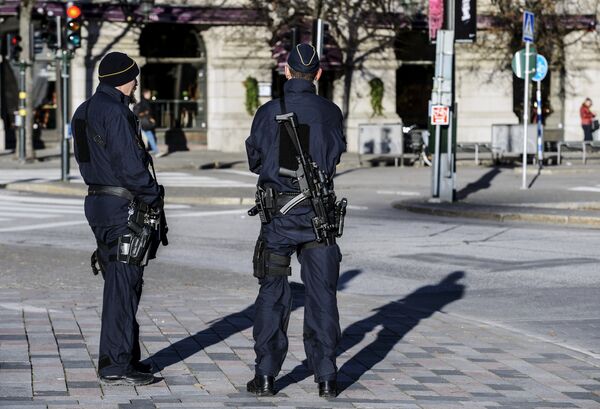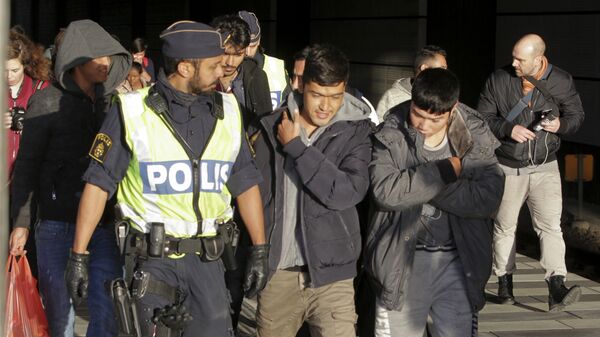On 19 September, journalists from the Swedish national public television broadcaster Sveriges Television AB (SVT) were attacked with stones while reporting on the building of an Islamic Centre in the Stenhagen district of Uppsala, known for its considerable migrant population. The Swedish police immediately launched an investigation into the attempted assault and injury.
It is not the first stone-throwing incident to have occurred in the Stenhagen neighbourhood, as controversy over the construction of an Islamic Centre next to St. Mary's Church in the district has been going on for the last six years. The Dawa Foundation, a Swedish Islamic organisation, owns the land in Stenhagen and applied to the Swedish authorities to build the Muslim house of worship several years ago.
On 7 September, representatives of the Sweden Democrats (SD), the country's conservative party, were pelted with stones in Stenhagen during a campaign against the construction of the planned mosque. Some stones were up to 10 centimetres in length and most were about half that size, as one of the SD campaigners, Simon Alm, described in his Facebook post.
However, according to SVT, the Planning and Building Board approved the detailed plan of the new Islamic centre in the Uppsala district last Thursday, which means that there are no more obstacles standing in the way of the centre's construction.
Stone-Throwing Incident as Indicator of Greater Trouble
It appears that the latest attack on the national broadcaster's reporters has changed their tone, prompting them to address the broader social trouble which has been brewing for the past few years in the country: Sweden is one of a handful of countries to accept a record number of migrants in recent years.
According to the official statistics, 806,155 newcomers were awarded residencies in Sweden between 2013 and 2018, i.e. almost 10 per cent of the entire population.
Anders Hellström, associate professor in political science at the Institute for Studies of Migration, Diversity, and Welfare at Malmö University, insists that stone-throwing is not common for Sweden, adding that those incidents "have actually become less frequent during the years".
Bilyana Martinovski, an associate professor in Human-Machine Interaction, who was expelled from Stockholm University over her research into migrant-related rape cases in Sweden; she insists the opposite is true: the problem is by no means fading.
"Stone-throwing is frequent, especially at police," she says. "Most interesting was the taxpayer-funded SVT programme by Janne Josefsson; when he visited a migrant area in Göteborg [in May 2019] where a guard was heavily beaten by a male migrant gang, almost to death. This prominent journalist was in shock, things there have become much worse than the [community] he reported on 20 years earlier in the same place."
She notes that Josefsson's podcast revealed that law enforcement agents avoid migrant gang areas and that the gangs watch the police with drones and know each move they make.

The Other Side of Immigration: Rapes & No-Go Zones
"This is just Göteborg", Martinovski notes. "Things are worse in Malmö, now in Uppsala, and of course in Stockholm. Some media and journalists have now started 'screaming out' that things went wrong, while others claim all is fine. It is not clear: what does 'all is fine' mean? It could mean that this was the plan and all goes according to plan, or it could mean that 8,000 rapes per year and 120 explosions in nine months is the new normal in Sweden, according to some, but certainly not for all."
In early September, SVT raised the issue of no-go zones populated by North African and Middle Eastern immigrants unwilling to integrate into European society. According to the Swedish broadcaster, some Swedish municipalities have been forced to hire private security companies to tackle growing crime and violence because of a lack of municipal police to conduct adequate patrols in the cities.
According to Martinovski, Uppsala, previously known for being the town where the "father of botany" Carl von Linne is buried, has recently gained prominence for rapes. She recalled the story of a local resident named Angelica, who was raped by alleged Arab migrants who stormed into her apartment. The young woman later committed suicide because the police decided to end the investigation despite the fact that they had DNA, the professor recalls.
Why Idea of Repatriating Migrants Taking on New Significance in Sweden
The migration problem is triggering growing concerns among Swedes. Apparently, therefore, the Sweden Democrats, a party with a well-articulated anti-immigrant agenda, has emerged as one of the largest political forces in Sweden's Rikstag in the aftermath of the September 2018 legislative vote.
Meanwhile, the idea of repatriating migrants, pioneered ahead of the 2018 election by the right-wing party Alternative for Sweden, is now spreading like wildfire in Swedish society. Last week, Svenska Dagbladet's leading conservative columnist Ivar Arpi sparked a debate by suggesting in a series of tweets that the time was ripe for Sweden to consider the annual repatriations of refugees.
Anders Hellström agrees that the Swedish society has become "more polarised" over the issue. According to him, "the reception crisis was a window of opportunity for the mobilisation of parties and movements on both sides, either pro- or anti-immigration."
Hellström says that Sweden "is no longer exceptional" and "mainstream politicians and journalists address these issues today," while "maybe [for] ten years they did not, at least not to the same degree".
"Norms of universal human rights are no longer unequivocally praised. As I said before, this is a sign of polarisation, not necessarily negativity," he suggests.
For her part, Martinovski believes that the increasing attention to the migrant dilemma in the mainstream media indicates that the cup of Swedes' patience has overflowed.
She highlights that in addition to growing crime rates, the government's open-border policy has caused Swedish municipalities to declare bankruptcy by laying on them the excessive financial burden of receiving and integrating newcomers.
"It seems that there is a shift in substance and tone the media posture the past two months, indeed," she suggests. "Not only in Schibsted Media's SvD but also in Bonnier Group's Expressen and in GP.se. What changed is the volume of violence and costs, they reached a critical number of people, which constituted the tipping point, the crest of a wave which starts to slam down."
According to the academic, "Sweden is becoming conservative, driven by extreme liberalism, extreme leftism and extreme globalism."


